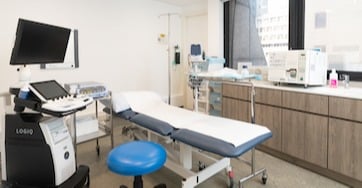Finding a breast lump is usually no reason for concern as most breast lumps are harmless. Stay educated and aware of any changes you discover in your breasts. In this blog, we go through some reasons why you might have found a breast lump, what it means and what to do next, as well as some information on breast cancer.
Causes of Breast Lumps
There are different reasons why breast lumps develop. The two most common reasons for benign breast lumps are due to fibroadenomas and breast cysts[1].
Fibroadenomas
A fibroadenoma is a common benign breast condition that often develops during puberty, but can occur in women of any age[2]. They are solid tissue growths that can be tender or even painful, particularly before a period[2].
A fibroadenoma is felt as a lump in the breast that is smooth and easily moves under the skin. There is no known cause of fibroadenoma, but it's likely due to hormonal changes[2],[3].
Breast Cysts
Breast cysts are also a common benign breast condition caused by sacs (milk glands) filled with fluid secretions from breast glands. They typically develop as breasts change due to changes in hormonal levels[4].
Breast cysts can feel soft or hard and can vary in size. Before menstruation, cysts may become more prominent and sorer as hormone levels change. Cysts can be aspirated with a fine needle to make them disappear if the pain is too much to handle[5].
Be Breast Cancer Aware
Most breast lumps are not cancerous, but it's always best to have them checked by a doctor.
Regular self-examinations also help you become familiar with your breasts and any changes in your breasts. If you find a breast lump that concerns you, please visit your doctor.
Symptoms of Breast Cancer
If breast cancer is detected and diagnosed early on, the likelihood of recovery is very high[6][7]. That’s why it’s essential for women to check their breasts regularly, to know the symptoms and to have any changes examined by a doctor.
The first symptom most women notice is a lump or thickened area of tissue on the breast. Most breast lumps are not cancerous, but they should always be checked and cleared by a doctor.
Other common symptoms of breast cancer include[8]:
- A new lump or area of thickened tissue that was not there before
- Change in the size or shape of one or both breasts
- Discharge from nipples
- Lump or swelling in armpits
- Dimpling on the breast skin
- Rash on or around your nipple
- Change in the appearance of your nipples
Note: Breast pain is not usually a symptom of breast cancer.
You should see your doctor if you experience any of the symptoms above.
What Can Breast Cancer Look and Feel Like?
Below is a visual example of how breast cancer can look like

Source: Know Your Lemons Foundation
Breast Cancer Screening and Prevention
Breast Self-Examination
Self-breast examinations should be done once a month to familiarise yourself with how your breasts normally look and feel[9]. It’s recommended to examine your breasts 2-3 days after your menstrual period. If you no longer menstruate, you should still examine your breasts regularly, around once a month[5],[9].
Mammography
Mammography is a screening method that uses a low-dose x-ray to spot cancers when they are too small to see or feel. During a mammogram, breasts are placed between 2 plates to get an image of the breast tissue.
Mammograms are offered to women over 40 years old[10] as the likelihood of breast cancer increases with age[7]. While mammograms are the best screening tool for breast cancer available today, it isn’t perfect. There are some risks such as false-positive or false-negative results [6],[11]. We recommend discussing all your screening options with your doctor.
The Hong Kong Department of Health prefers to support the “breast aware” method, where all women are aware of their breasts’ changes and have discussions of these changes with their doctors[6].
Well Woman Check-ups
In conclusion, most breast lumps are not cancerous, but it is always best to be safe and have them checked by a doctor.
Having a well-woman check-up is an excellent opportunity for women to discuss their concerns regarding breast lumps, breast screenings and other frequent areas of concern such as cancers and cervical health. You can learn more about our preventative screening packages here.
Check your breasts regularly and be breast aware.
References
- Johns Hopkins Medicine. (2021). ‘Common Benign Lumps’. Hopkins Medicine. Available at: <https://www.hopkinsmedicine.org/health/conditions-and-diseases/common-benign-lumps> [Accessed 16 July 2021]
- Breast Cancer Now. (2019). ‘Fibroadenoma’. Breast Cancer Now. July 2019. Available at: <https://breastcancernow.org/information-support/have-i-got-breast-cancer/benign-breast-conditions/fibroadenoma> [Accessed 16 July 2021]
- Healthline. (2019). ‘Breast Lump’. Healthline. 14 August 2019. Available at: <https://www.healthline.com/health/breast-lump> [Accessed 16 July 2021]
- Breast Cancer Now. (2019). ‘Breast Cysts’. Breast Cancer Now. May 2019. Available at: <https://breastcancernow.org/information-support/have-i-got-breast-cancer/breast-pain-other-benign-conditions/breast-cysts> [Accessed 16 July 2021]
- Family Planning Association of Hong Kong. (2021). ‘Breast Problems and Breast Cancer’. FPAHK. Available at: <https://www.famplan.org.hk/en/health-info/common-gynaecological-diseases/breast-problems-and-breast-cancer> [Accessed 16 July 2021]
- Centre for Health Protection. (2021). ‘Recommendations on Prevention and Screening for Breast Cancer for Health Professionals’. Centre for Health Protection. January 2021. Available at: <https://www.chp.gov.hk/files/pdf/breast_cancer_professional_hp.pdf> [Accessed 16 July 2021]
- National Health Service. (2021). ‘Breast Cancer Screening’. NHS. 27 March 2021. Available at: <https://www.nhs.uk/conditions/breast-cancer-screening/> [Accessed 16 July 2021]
- National Health Service. (2019). ‘Breast Cancer in Women’. NHS. 28 October 2019. Available at: <https://www.nhs.uk/conditions/breast-cancer/> [Accessed 16 July 2021]
- Breast Cancer Org. (2019). ‘Breast Self-Exam’. Breastcancer.org. 24 October 2019. Available at: <https://www.breastcancer.org/symptoms/testing/types/self_exam> [Accessed 16 July 2021]
- Hong Kong Breast Cancer Foundation. (2021). ‘Breast Screening FAQ’. HK Breast Cancer Foundation. Available at: <https://www.hkbcf.org/en/breast_health_centre/main/21/> [Accessed 16 July 2021]
- Cancer Research UK. (2020). ‘Breast Screening’. Cancer Research UK. 03 September 2020. Available at: <https://www.cancerresearchuk.org/about-cancer/breast-cancer/getting-diagnosed/screening/breast-screening> [Accessed 16 July 2021]

 Central General Practice
Central General Practice
 Repulse Bay
Repulse Bay
 Clearwater Bay
Clearwater Bay
 BodyWorX Clinic
BodyWorX Clinic
 Central Specialist Clinic
Central Specialist Clinic
 MindWorX Clinic
MindWorX Clinic
 Partner Clinics
Partner Clinics
 Family Clinic
Family Clinic
 OT&P Annerley Midwives Clinic
OT&P Annerley Midwives Clinic


